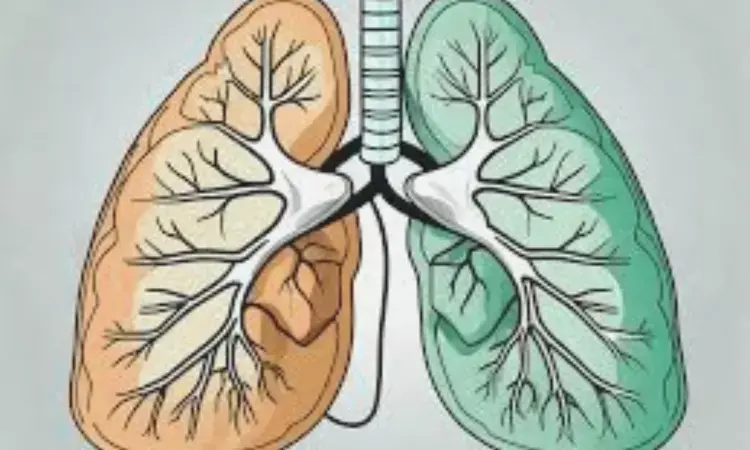- Home
- Medical news & Guidelines
- Anesthesiology
- Cardiology and CTVS
- Critical Care
- Dentistry
- Dermatology
- Diabetes and Endocrinology
- ENT
- Gastroenterology
- Medicine
- Nephrology
- Neurology
- Obstretics-Gynaecology
- Oncology
- Ophthalmology
- Orthopaedics
- Pediatrics-Neonatology
- Psychiatry
- Pulmonology
- Radiology
- Surgery
- Urology
- Laboratory Medicine
- Diet
- Nursing
- Paramedical
- Physiotherapy
- Health news
- Fact Check
- Bone Health Fact Check
- Brain Health Fact Check
- Cancer Related Fact Check
- Child Care Fact Check
- Dental and oral health fact check
- Diabetes and metabolic health fact check
- Diet and Nutrition Fact Check
- Eye and ENT Care Fact Check
- Fitness fact check
- Gut health fact check
- Heart health fact check
- Kidney health fact check
- Medical education fact check
- Men's health fact check
- Respiratory fact check
- Skin and hair care fact check
- Vaccine and Immunization fact check
- Women's health fact check
- AYUSH
- State News
- Andaman and Nicobar Islands
- Andhra Pradesh
- Arunachal Pradesh
- Assam
- Bihar
- Chandigarh
- Chattisgarh
- Dadra and Nagar Haveli
- Daman and Diu
- Delhi
- Goa
- Gujarat
- Haryana
- Himachal Pradesh
- Jammu & Kashmir
- Jharkhand
- Karnataka
- Kerala
- Ladakh
- Lakshadweep
- Madhya Pradesh
- Maharashtra
- Manipur
- Meghalaya
- Mizoram
- Nagaland
- Odisha
- Puducherry
- Punjab
- Rajasthan
- Sikkim
- Tamil Nadu
- Telangana
- Tripura
- Uttar Pradesh
- Uttrakhand
- West Bengal
- Medical Education
- Industry
Type 2 inflammation may accelerate lung function decline in individuals with chronic airway diseases: Study

Denmark: A recent study has shown that type 2 inflammation indicated by increased blood eosinophils (BE) and a fraction of exhaled nitric oxide (FeNO) is associated with accelerated lung function decline in patients with chronic airway disease in the general population. The study was published online in the BMJ journal Thorax.
"For every 100 cells/µL increase in blood eosinophils and each 10 ppb rise in FeNO, FEV1 decline intensified by 1.0 mL/year and 3.2 mL/year, respectively," the researchers reported. "The most significant decline was seen in patients with asthma-like phenotypes."
There is no clarity on whether type-2 inflammation is associated with accelerated lung function decline in patients with asthma and chronic obstructive pulmonary disease (COPD). Considering this, Yunus Çolak, Copenhagen University Hospital - Herlev and Gentofte, Copenhagen, Denmark, and colleagues tested the hypothesis that type 2 inflammation indicated by elevated BE and FeNO is linked with accelerated lung function decline in the general population.
For this purpose, adults from the Copenhagen General Population Study with measurements of BE (N=15 605) and FeNO (N=2583) were included in a follow-up examination and assessed FEV1 decline in the preceding 10 years. Participants were assigned as not having airway disease, asthma with full reversibility (AR), COPD, asthma with persistent obstruction (APO), and not classifiable airflow limitation (NAL) based on pre-and post-bronchodilator lung function, smoking history and asthma at follow-up examination.
Based on the study, the researchers reported the following findings:
- FEV1 decline in mL/year increased with 1.0 per 100 cells/µL higher BE and with 3.2 per 10 ppb higher FeNO.
- Adjusted FEV1 decline in mL/year was 18 in those with BE<300 cells/µL and FeNO<20 ppb, 22 in BE≥300 cells/µL or FeNO≥20 ppb, and 27 in those with BE≥300 cells/µL and FeNO≥20 ppb.
- Corresponding FEV1 declines were 24, 33 and 44 in AR, 26, 36 and 56 in APO, 32, 31 and 44 in COPD, and 27, 35, and 37 in NAL, respectively.
"Type-2 inflammation marked by elevated BE and FeNO is associated with accelerated FEV1 decline in patients with chronic airway disease in the general population," the researchers wrote, adding that, "this association was most pronounced in an asthma-like phenotype."
Reference:
Çolak Y, Afzal S, Marott JL, et alType-2 inflammation and lung function decline in chronic airway disease in the general populationThorax Published Online First: 09 January 2024. doi: 10.1136/thorax-2023-220972
Dr Kamal Kant Kohli-MBBS, DTCD- a chest specialist with more than 30 years of practice and a flair for writing clinical articles, Dr Kamal Kant Kohli joined Medical Dialogues as a Chief Editor of Medical News. Besides writing articles, as an editor, he proofreads and verifies all the medical content published on Medical Dialogues including those coming from journals, studies,medical conferences,guidelines etc. Email: drkohli@medicaldialogues.in. Contact no. 011-43720751


